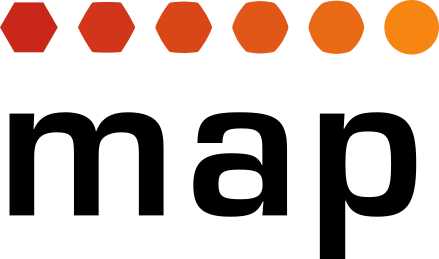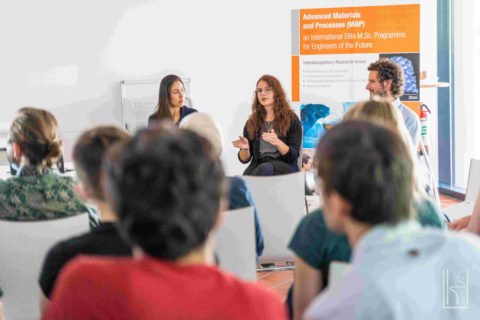2022 MAP Alumni Round Table and Graduation Ceremony
As a traditional MAP event, the annual MAP Alumni Round Table offers MAP students a valuable opportunity to network with MAP alumni. Despite the Corona pandemic, we were pleased to hold the alumni round table offline again on 12 July 2022. During this event, several MAP alumni shared their current careers and experiences with us MAP students, followed by the graduation ceremony. The whole event was moderated by Semanti Banerjee and Lara Đelević from the 2021 batch.
MAP Alumni Round Table
Three alumni reported on their careers after finishing the MAP programme and answered many questions of the current students and professors. Stefanie Düll from 2016 batch, who is now a project manager at Siemens Logistics, Valariee de Abreu from the 2015 batch, who is now working as a materials engineer developing X-ray imaging devices at VEC Imaging GmbH & Co. KG, and Maximilian Göltz from the 2012 batch, who is currently finishing his doctorate at FAU.
Stefanie Düll
She chose “Computational Materials Science” and “Process Simulation and Nanomaterials and -technology” as Focal Subjects during her studies in MAP. After graduating from MAP, she worked at Siemens and was responsible for material flow simulation at the beginning. As a native German, she decided to change position to a less international field and now works in semiconductors and EV systems.
When asked about what she gained the most from MAP, she said that self-study is the most important skill she has learned here. She gave an example of her miniproject where she greatly improved her self-study skills. She also shared her experience when searching for a job at the beginning. She told us that job positions sometimes are not really open, so we should never be frustrated if we don’t get any response. Besides, she also reminded us to wait for the contract and then decide whether to give it up, which is a very useful information for job seekers.
Valariee de Abreu
During her studies, Valariee de Abreu focused on “Nanomaterials and -technology” and “Biomaterials and -processing”. She is originally from Venezuela and finished MAP in 2018.
As her most important skills gained during the programme she named “stress resistance”, “self-confidence” and the experience of her HiWi-job/miniproject. For later application in industry, she gave tips for the current students: “Of course, good grades and experience are necessary, but the most important thing is the correct attitude and being eager to learn new things.” And she advised us to not be afraid of making decisions. She encouraged us to do internships and HiWi-jobs, because not only do they offer practical experience, but also the possibility to learn more about a company and a team. She hinted that often people will offer you a permanent job after you finished your project with them and both sides were satisfied by the work.
In questions regarding the MAP programme, she criticized the pressure put on students by the examination policy. This has already been (partly) changed since her graduation: Now students can fail and retry every exam once. Furthermore, she emphasized the advantage of the specialization opportunities during her studies through the miniprojects, the internship and the thesis. This enables graduates to specialize and go into both industry and academia likewise.
Maximilian Göltz
After finishing his bachelor’s in Materials Science, he continued his studies in MAP and participated in the Focal Subjects “Advanced Processes” and “Nanomaterials and -technology”. Now he is a PhD student focusing on the use of coating.
What impressed him a lot about his PhD studies was also self-learning. He shared with us, that he knew less about this particular field when he started his PhD, but now he knows more with increasing time and learning. When talking about the relation between industry and academia, he said that a PhD is in high demand in the chemical industry, while it is less needed in the operational process of industry. He also shared his experiences about applying for a PhD and gave some advice for choosing a topic.
The graduation ceremony
After two years of online ceremonies due to Corona, the event could finally be held in person again. The graduation ceremony was opened by Prof. Nicolas Vogel after the alumni round table. He was very pleased to finally celebrate this important moment with the graduates in person again. However, he pointed out that despite Corona (hopefully) being over, the world still is in great turmoil. The past two years have proven that the world needs highly skilled scientists and engineers to tackle the accumulating problems of our time (and future), be it the climate change or political propaganda. Prof. Vogel pointed out three important skills: “Seeking the truth”, “interdisciplinary” and “international collaborations”. He hopes that the graduates have gained these abilities during their time in the MAP programme and is sure that the new alumni are equipped for their way into the future. Following his speech, he and Prof. Peter Felfer handed over graduation presents to the (now) former MAP students. In total seven people from all around the world finished their studies in the last year and were able to celebrate their graduation with us. They were from Bangladesh, Germany, Greece, India and Poland. Their journey in MAP started in 2017, 2018 and 2019. After the ceremony, the evening ended in a get-together with plenty of food and drinks, where finally the younger students had a great chance to get to know the alumni and graduates personally. Many new contacts were made and old friends reunited. The evening ended at about 10 pm.
By MAP students Tengda Huang (matriculation group 2020) and Andreas Schuß (matriculation group 2021)

